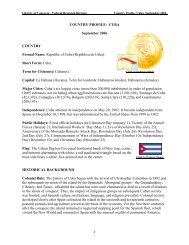1 - American Memory
1 - American Memory
1 - American Memory
You also want an ePaper? Increase the reach of your titles
YUMPU automatically turns print PDFs into web optimized ePapers that Google loves.
248<br />
and warehouse space would be used up within a few weeks. This would necessi-<br />
tate temporary storage outside with the contingent problems of whether hazard<br />
and pilferage. A stoppage of flow of canned pineapple to the mainland would also<br />
affect the industry's summer sales promotion.<br />
Food stores also have varied inventory periods and while certain items may<br />
have been stockpiled, fresh produce and meats would not be as plentiful. Food<br />
suppliers for restaurants would also feel the impact of a shipping storage. While<br />
certain meats and produce could be air freighted, there would be additional costs<br />
involved.<br />
The travel industry would feel the impact both in terms of possible cancella-<br />
tions by tourist groups and also in delays of completion of new hotels scheduled<br />
for opening this summer. Occupancy rates in Hawaii are generally lower at pres-<br />
ent and the industry has launched an intensive campaign to boost travel to<br />
Hawaii. A shipping strike would add a negative factor to the total effort.<br />
The impact on employment will be immediate. The retail stores will start<br />
layoffs as soon as the shipping strike occurs. History has shown that the con-<br />
sumers tighten their purse strings as soon as announcement Is made of any<br />
interference with normal shipping patterns and this immediately affects pur-<br />
chasing in retail stores. So the stores protect themselves by initiating Imme-<br />
diate layoffs of personnel.<br />
Businesses involved in the unloading, loading, and trucking of items from<br />
the docks to the warehouses would be immediately affected by a stoppage of<br />
work. During the West Coast container boycott earlier this year, the trucking<br />
industry had to lay off about 160 employees because there was no work<br />
available.<br />
It would seem In general that overall there would be no great Impact in<br />
terms of shortages, delays, etc. for about 30 days perhaps 45 days. There will<br />
be certain items which will become short within a period of two weeks.<br />
While a strike may not occur, there will still be a definite impact to be felt<br />
by the people In Hawaii. The need to stockpile and have Inventory on hand<br />
beyond the normal level and the need to rent warehouse space and the allow-<br />
ance for spoilage and pilferage will be reflected In the prices of these items.<br />
The amount of money tied up In Inventory at high interest rates further add<br />
to the cost of goods.<br />
STATEMENT OF EDMUND J. FLYNN, PBESIDEKT, PACIFIC MARITIME ASSOCIATION<br />
Pacific Maritime Association is a non-profit corporation, having a membership<br />
comprised of 12 <strong>American</strong> Flag Steamship Companies, 4 of whom operate under<br />
Pacific Maritime Association West Coast Contracts, 44 Foreign Flag Steamship<br />
Companies, and 78 Stevedoring and Terminal Companies.<br />
The principal office of the Association is In San Francisco. Area offices are<br />
maintained in Wilmington, California, for Los Angeles-Long Beach, in San Fran-<br />
cisco, in Portland, Oregon, and in Seattle, Washington.<br />
The present Association was incorporated in 1949, as successor to the Water-<br />
front Employers of the Pacific Coast and the Pacific <strong>American</strong> Shipowners'<br />
Association, which had been in business for many years as bargaining representa-<br />
tives of on.shore and offshore maritime employers on the Pacific Coast.<br />
The Association exists to negotiate and administer collective bargaining<br />
agreements with various maritime unions. Beginning in 1934, following the<br />
general strike in San Francisco, the coastwide pattern for bargaining was<br />
established by governmental direction. As a result, a single "Master Contract"<br />
between the Association and the International Longshoremen's and Warehouse-<br />
men's Union covers all cargo handling in all Pacific Coast ports from Mexico to<br />
the Canadian border. The same International Union has contracts with other<br />
maritime employer groups in the States of Hawaii and Alaska. Similarly, "master<br />
contracts" exist between the Association and each of the following unions, cover-<br />
ing shipboard personnel on practically all <strong>American</strong> Flag vessels headquartered<br />
on the Pacific Coast:<br />
Masters, Mates and Pilots (licensed deck officers).<br />
Maritime Engineers' Beneficial Assn. (licensed engineers).<br />
<strong>American</strong> Radio Association (radio officers),<br />
Marine Staff Officers Assn. (pursers).<br />
Sailors'Union of the Pacific (unlicensed deck),<br />
Marine Firemen's Union (unlicensed engine).<br />
Marine Cooks and Stewards (cooks and stewards),



![Albert Einstein Papers [finding aid]. Library of Congress. [PDF ...](https://img.yumpu.com/21604228/1/190x245/albert-einstein-papers-finding-aid-library-of-congress-pdf-.jpg?quality=85)





![American Colony in Jerusalem Collection [finding aid]. Library of ...](https://img.yumpu.com/17941275/1/190x245/american-colony-in-jerusalem-collection-finding-aid-library-of-.jpg?quality=85)



![Piccard Family Papers [finding aid]. - American Memory - Library of ...](https://img.yumpu.com/17941234/1/190x245/piccard-family-papers-finding-aid-american-memory-library-of-.jpg?quality=85)


